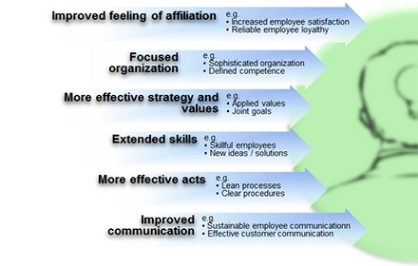Softbenefits
Soft benefits are advantages that result from initiatives that change the culture. The specific feature is that these advantages are not directly measureable. The only way is an inquiry of the target group and the derivation of respective insights. These elements are relevant in the handling of change and people.
In technical areas, like for example process, IT and production management, these aspects also have a large influence.
Soft benefits consist of six areas: Affiliation, organization, strategy and values, skills, acts, and communication.

Affiliation
Improving the feeling of belonging becomes visible in the co-operation, the team spirit and the commitment to the organization. Core element is an organizational culture that gives people enough space for maximum performances. Important conditions are contentual, formal and personal circumstances, e.g. attractive projects, clearly defined tasks and fair, incentives.
Organization
The aligned organization is characterized by defined structures and processes. It is crucial that the staff can find themselves in the organizational and process organization. This includes clear tasks, authority and responsibility (TAR) as well as descriptions of the processes on different levels of detail (e.g. value chains, process maps, process chains).
Strategy and values
Important soft benefits are the strategy and the system of values. They offer a clear direction (e.g. vision, mission, guidelines, values, goals). In this context, it is important to incorporate these elements into the enterprise. For example, the waterfall model that spreads these elements broadly top down, leads to continuous distortion of the contents. Therefore, the strategy is becoming ineffective and pollutes the previously mentioned feeling of togetherness. The management of change starts already with the joint development of strategies and values.
Skills
The increased complexity of the business processes requires more and more flexible employees, who follow and make decisions independently. For this purpose, they need technical, methodological, social and systemic abilities. In order to achieve this, qualification, measures for a competent skill management based on respective profiles are needed.
Acts
Effective acting results from the interaction of various soft factors. The personnel need the relevant information and the authority to act. On the one hand, this takes place via the skillful organization (see the above) and on the other hand via strict transfer into everyday life. The superiors have a great influence through decisive, personal realization of the own organizational culture by being a role model - to act, as they say.
Communication
Improved communication includes all channels that are used in the enterprise - personal encounters, meetings, email, INet and all other media. Everybody conveys information and is permanently in contact with everybody, internally and externally. These contacts with customers, supplier, authorities and networks require new approaches. Open, internal exchange of information is required for optimization that supplies everyone with relevant information.
